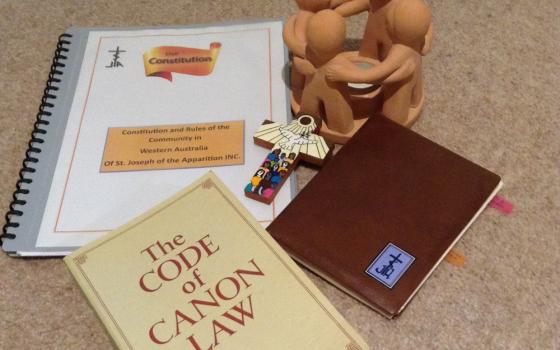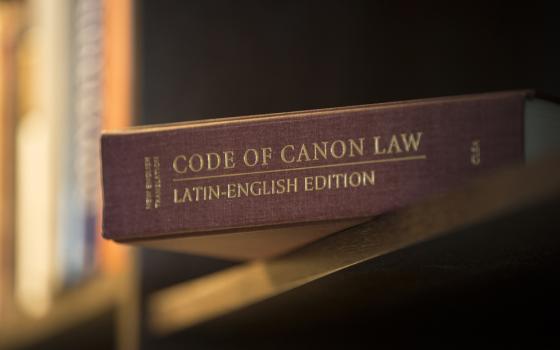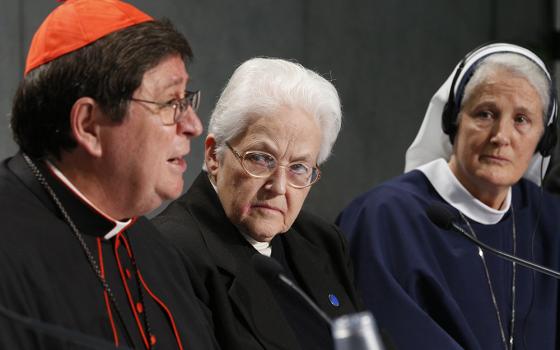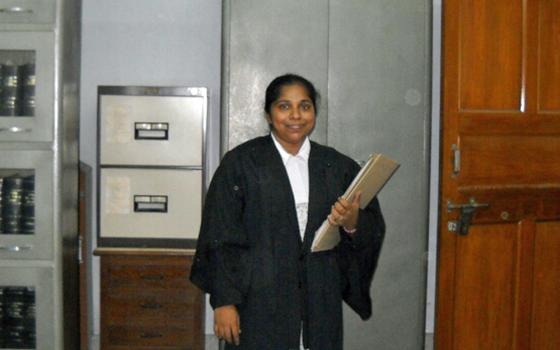This month, The Life panelists shared stories from their own congregations and other groups of women religious of how they benefit from legal structures afforded by their own constitutions as well as civil and canonical law. They responded to this question:
In your experience, is canon law oppressive of women religious, or is it more of a legal protection? Do you think religious congregations could use civil law more to enhance their ministry?
______

Amy Hereford is a Sister of St. Joseph from St. Louis. Her background includes teaching, communication, management and administration. As an author, theologian, and civil and canon lawyer, she consults with religious communities and charitable organizations around the world, addressing technical concerns of religious institutes and exploring the evolving nature of religious life.
I work as an attorney and canonist, assisting religious communities to work through the thornier issues of their life together. I think law gets a bad rap because people often call an attorney or canonist when something is going wrong. But the same is true of other service professionals. Something hurts and we call a health care professional. Our car stops working and we call a mechanic. When something isn't working in communities, they can call on a host of professionals who can assist, and a canonist is one of those people. Canon law doesn't cause the problem any more than an oncologist causes cancer.
Good law embodies the values of a society; the constitutions of a religious community embody the values of our religious communities. They are internal law for the community; they state who we are in our common experience of God, community and mission; and they establish a framework for our life together. Most of life in our communities is lived within a sphere of freedom established by the legal framework of our constitutions. When conflict arises or relationships break down, the law helps us navigate the issues by reminding us of our fundamental shared values and of the rights and obligations that come from these values.
Religious institutes grow and change, mature and decline; they find it necessary to change their law and structures to reflect their new self-understanding and to embody the new articulation of their values. Law in religious institutes establishes governance, organizes activities, guides relations within and without the institute in justice and charity, helps us mediate between competing interests and values, and orients and sustains the entire life of the institute so that all together, the institute and its members may "follow Christ with greater freedom ... under the action of the Holy Spirit" (Perfectae Caritatis).
Religious communities experience their life and mission in the wider context of the Catholic Church, which has its own law, i.e., canon law, embodying our values as a community of faith. Within the church, there are many theologies and opinions regarding who we are as a community of faith and the best way to live out our values in today's challenging society. Canon law in the wider church is largely written and implemented by the bishops, who have a particular perspective on our common Gospel values. When individuals or groups come into conflict with clerics, canon law provides some important protections, but it places most of the power in the hands of the clerics.

Cecilia Oluchi Dimaku is in the Congregation of the Sisters of the Sacred Heart of Jesus, an indigenous institute in Nigeria. She has held business positions in schools, her diocese and her community. After 12 years in leadership, she was missioned to the Sisters of the Holy Family in the United States, where she works as payroll/personnel coordinator at their academy in New Orleans.
Laws — civil or canonical — are enacted to maintain order, set and protect boundaries for human interactions. While civil law maintains rules and order in the society, canon law governs the administration and organizational structures of the church. In Nigeria, with its multiethnic cultures and traditions, we rely on the stipulations of civil law to guide our relationships with and ministry to the larger community.
Personally, I do not see canon law as oppressive of women religious. The Code of Canon Law provides legal protection for women religious within the church. In the governance of religious institutes, the code gives all the powers and rights for consecrated persons to govern themselves according to their institute's own law — Canon 627.2. In my experience as a member of an indigenous congregation founded by the bishop of our local diocese, canon law guided our relationship with him and enabled us to stand by our decisions even when the bishop did not agree with those decisions. The Code of Canon Law safeguarded the internal governance of our institute.
As religious, we operate in a diverse society and in relationship with entities such as public and private sectors of business, the government of the country, as well as the civil society. This relationship is more global and extensive in nature. The civil law enhances our ministry to and relationships with these entities and grants us the legal requirements necessary for successful and peaceful ministry.
My congregation has presence in the northern part of Nigeria with a predominantly Moslem population. Our ministry to this group and our relationship with them are guided by the articles of the civil law. In our counter-trafficking projects and in our ministry to victims of human trafficking, we collaborate with members of other religions. Our collaboration is enhanced by civil law, and one of our sisters who is a civil lawyer is our greatest resource in this collaboration.
In fact, women religious could use civil law more. While canon law guides our life in the church, civil law connects us with the larger society, the vast majority of people who are not affected in any way by canon law. Civil law enhances relationships with society at large in the ministry of women religious.

Karlyn Cauley belongs to the Sisters of the Divine Savior in Milwaukee. A studio artist, she ministered in art education and with sisters in temporary vows in her congregation's formation program for many years. Presently, she does ecumenical work in the adult spirituality of women.
The apostolic visitation of 2010 that involved many religious congregations of women in the United States had a profound effect on sisters. The few bishops who had singled out the religious of the United States for this investigation began a difficult process. We were surprised, even shocked to think we may have been unfaithful to the church we loved.
But later, the Leadership Conference of Women Religious, our congregations, and we who live a life of fidelity as sisters realized the great benefits we received from reclaiming our charisms and identities and keeping our church and ourselves in profound prayer in the four-year process.
Public media followed the process and gave a new visibility to both apostolic and contemplative communities, attracting women to inquire about our lives. Many people wrote and thanked congregations who educated them and set them on their life journeys. And not just Catholics: Sisters were affirmed by a wider audience of admirers who knew how the sisters care for people on the margins of society.
Many of our congregational leaders took advantage of teams of canon lawyers who made themselves available to help us through the visitation.
LCWR is a recognized canonical organization with bylaws for governance. It is also a civil organization governed by civil law. Civil law has many requirements for finances, licensing institutions, incorporation of hospitals, schools, clinics and the parishes where the sisters have residences. Some of the most complex requirements exist for health institutions and their services to patients.
Both religious and secular cultures impact our lives as sisters. Many congregations in the United States have legal and financial advisers who provide internal checks and balances to meet the many civil law and canonical law requirements. Most ministries of sisters and the institutions where they minister are not-for-profit organizations. It means the work is not taxed, and there are strict legal guidelines for maintaining such status.
We tend to think our lives as sisters are lived according to our Rule of Life/constitutions, which were approved canonically, but many areas of our life also receive structure from civil law. Sisters make wills, need help after a car accident, have Social Security concerns, and get medical treatment — all common ways civil law protects and provides for members.
After being elected by the members, our community leadership must learn a great amount of information and have capable legal advisers. They need our prayers to do their ministry wisely.

Lilian Bong is a Sister of St. Joseph of the Apparition of Western Australia. Born in Malaysia and trained as a nurse, she did medical mission outreach in Myanmar before making her final profession in 2016. Now she serves as second councilor to the provincial, does vocation / mission appeal work, and has a special ministry to elderly Chinese people.
Jesus replied to the Pharisees and Herodians — people with authority and power — "Pay Caesar what belongs to Caesar and God what belongs to God" when they asked him, "Is it permissible to pay taxes to Caesar or not?"
Let me share a real situation regarding obedience to Canon 668, from which part of our congregation's constitution is derived. It concerns consecrated members ceding the administration of their goods before their first profession.
A week before I made my vows, my leader handed me a form to sign. It indicated that from the day I pronounced my vows, I could no longer administer my goods or money or manage my personal bank accounts. I remember asking whether I could file my tax claim at the end of the financial year, which all working citizens are obligated to do under the civil law. She replied: "That you cannot do and need not do any more, according to canon law. The finance manager will see to it from now on."

In the back of my mind I worried: "What if he doesn't file it for me?" But on the other hand, I was thrilled at not having to do this tedious and time-consuming task anymore.
Lo and behold, the "unimaginable" happened. About four-and-a-half years later, when I was working as a registered nurse, I received many letters from the Australian Taxation Office asking why I hadn't lodged my yearly tax claim. The letters demanded immediate payment since I had failed in the past years to declare my earned income.
Sure enough, our finance manager had not filed any of my tax declarations, thinking that because I was a religious, I didn't need to do this anymore. I was not only appalled and angry, but also frightened about what the government actions against me might be.
In such circumstances, canon law interpreted and imposed upon religious members through the congregation's constitution can actually prevent the member from fulfilling his or her civil duties in accordance to the civil law of the country.
On this note, it is certainly more advisable for members of a religious institute to abide by the law of the land where one is missioned! Jesus would surely mean for all consecrated women or men to do the same when he replied, "Render to Caesar what is Caesar's and to God which belongs to God."

Tarianne DeYonker is a Dominican Sister of Adrian, Michigan. She has ministered as teacher, administrator, public speaker, marriage/family therapist, group facilitator and program developer. She also served as vicaress and general councilor of her congregation. Presently beginning a ministry in Adrian in vocation work, she also facilitates creative writing workshops.
Our sisters regularly make use of civil law. Here are three stories of our sisters' involvement with civil law processes that work for people!
Chicago: Dominican Sr. Dot Dempsey recounts one upsetting experience as an immigration court watcher. In a 45-year-old man's court hearing — after 22 years of incarceration, during which he was cleared of the crime — he was about to be released when U.S. Immigration and Customs Enforcement realized he wasn't a U.S. citizen and wanted to deport him. He had been brought here as a 2-year-old. Sister was moved by his humiliation in front of parents, sisters and son as he arrived in an orange prison uniform, hands bound, head down and lawyers drilling him with questions. After work on his status, he may be paroled, but this experience will not be erased for a lifetime, especially his son's.
Michigan: Dominican Sr. Marilyn Winter believes collaboration is the key for the Michigan Human Trafficking Task Force. Represented are law enforcement, mental health practitioners, medical professionals, counselors, sexual assault services, schools, United Way, Zonta, Catholic Charities and Adrian Dominican Sisters, who helped start this group. Successes include new laws, enforcement tools and awareness of the frequency of human trafficking and ways to combat traffickers and care for their victims.
Oakland, California: Dominican Sr. Marian Castellucio uses processes of restorative justice employed by the Mental Health Division of Catholic Charities of East Bay. When a juvenile offender was arrested for a crime, he or she could choose to go through the juvenile criminal justice system, which might result in a prison sentence, or the restorative justice system, which could result with their juvenile arrest being expunged. The person harmed could choose to participate in it to address the harm done.
The whole exchange was done in an environment that was as supportive as possible with recognition of the impact of the crime on the offender, the person harmed and the community of people surrounding both.
Breaking the pattern of an 80% chance of a life of crime, the restorative justice system gives juvenile offenders a chance to start again.
We sisters get involved with legislatures to create laws that guide just actions, including access to clean water, protections for immigrants, access to health care and food stamps, preventing election fraud and protecting citizens' right to vote. A life lived in right relationships requires citizen participation with civil law as ways to care about one another.

Cynthia Mathew belongs to the Congregation of Jesus from India. A social worker and lawyer, she worked with the Dalit people, prisoners, women and victims of human trafficking. She practiced law in the Patna High Court, working for juvenile delinquents and victims of rape and/or domestic violence. She is now serving as a representative to the United Nations for her congregation.
While canon law is necessary for good order within the church, the Code of Canon Law has not always kept pace with the times.
According to "Rights in the Church: Notes on Canon Law No. 2" by Catholics for a Free Choice, "When he published the most recent version of the law in 1983, Pope John Paul II said one of the code's most important contributions was its recognition of the rights of the laity. Lay Catholics have a right to know what's going on in their churches, they have a right to speak out about important issues, both religious and secular, and they have the right to be treated fairly, especially if an authority of the church is trying to punish them."
But there are no provisions in canon law that specify what is to be done if a bishop has failed to act on a case of child sex abuse. Recently, Pope Francis issued a ruling requiring all Catholic priests and nuns around the world to report clergy sexual abuse and cover-up by their superiors to church authorities in an unprecedented new effort to hold the Catholic hierarchy accountable for failing to protect their flocks.
According to The Associated Press, "The new church law provides whistle-blower protections for anyone making a report and requires all dioceses around the world to have a system in place to receive the claims confidentially. And it outlines procedures for conducting preliminary investigations when the accused is a bishop, cardinal or religious superior."
However, I am not sure this is going to prevent sexual abuse or bring justice to the victims. Most of the perpetrators are men, and the church authorities are men. How can one expect a female victim to get justice in a patriarchal, male-dominated system? So far, the hierarchical structure of the church has made it difficult to bring high-ranking figures to justice. There has been a culture of denial and secrecy that has prevented allegations from being fully investigated.
It is very important that we use civil law to bring justice to the victims of abuses perpetuated by church authorities. Civil lawsuits — legal claims brought by abuse victims for financial damages — have consistently been the only effective way to make Catholic church officials publicly and concretely accountable for their longstanding cover-up of unspeakable crimes.
The recent sensational case of sexual abuse in India is an example of a person who sought the help of the law of the land when justice was denied by the hierarchical church.
According to Outlook magazine, canon law and the Catholic Church do not give professed religious the right to sue the church. "It took six brave sisters of the Little Flower Convent, Narakkal in Ernakulam district [India], to prove it otherwise. They created history of sorts when they sued a Syro-Malabar bishop of the Ernakulam diocese and the priest of St. Mary's Church for criminal intimidation and forgery," and they won the case.
When the ecclesiastical forums do not act, we must seek justice from civil law.





